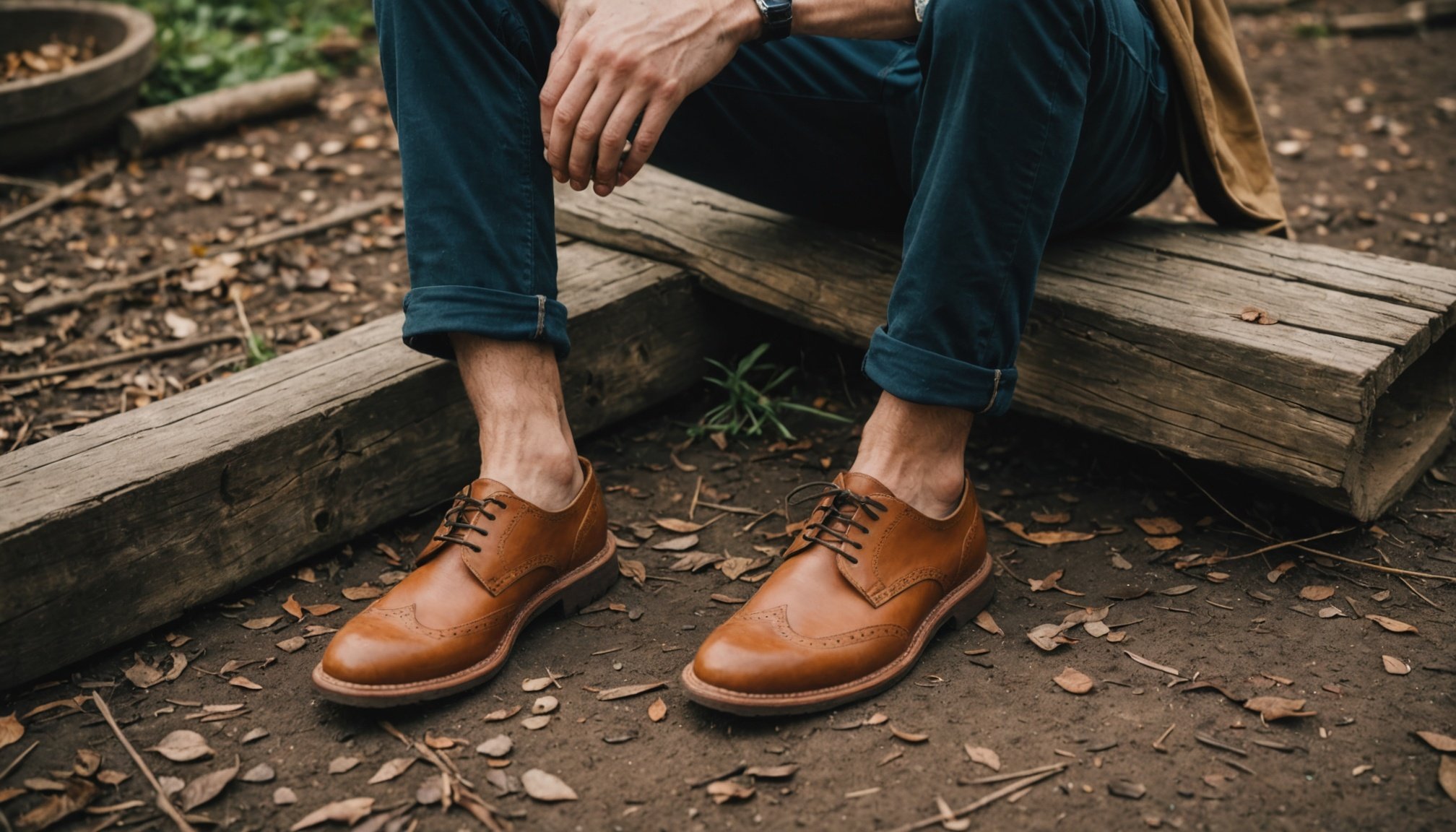Understanding Ethical Handcrafted Footwear
In recent years, ethical footwear has gained significant attention as consumers become more conscious of their impact on the world. But what exactly defines ethical footwear, and why is it important? Primarily, ethical footwear concerns itself with sustainable production methods, fair labour practices, and mindful material choices that minimise harm to the environment and society. These shoes often integrate principles that look beyond profit, aiming instead for the well-being of all stakeholders.
Handcrafted shoes provide immense benefits, offering individuality, craftsmanship, and often a greater emphasis on quality. Compared to mass-produced counterparts, these artisanal shoes typically have a smaller carbon footprint due to less mechanised production processes. Each handcrafted piece carries a personal touch, often crafted by skilled artisans dedicated to detailed workmanship. This level of craftsmanship not only ensures longevity but can also reduce consumption since durable products need fewer replacements over time.
Also to read : The Definitive Handbook for Choosing Ideal Sunglasses for a British Summer Festival Extravaganza
Moreover, intertwining sustainable practices into the footwear industry is crucial. Sustainable footwear promotes ecological balance by using eco-friendly materials and production techniques that conserve resources and energy. By embracing these practices, brands can significantly lessen their environmental impact, aligning with the growing consumer demand for products that support a healthier planet.
Materials in Ethical Footwear
In the realm of sustainable footwear, choosing eco-friendly materials is paramount. These materials, commonly used in ethical footwear, play a significant role in reducing environmental impact. For instance, natural fibres such as organic cotton and hemp are favoured due to their minimal ecological footprint. Compared to synthetic materials, they require less energy and water during production and are biodegradable, supporting long-term environmental sustainability.
Also to discover : The Definitive Handbook for Choosing the Ideal Race Day Handbag
Delving into the specifics, natural leather alternatives like Piñatex, made from pineapple leaf fibres, and mushroom leather are pioneering options that minimise reliance on traditional leather. These alternatives advance eco-friendly practices by reducing carbon emissions and deforestation caused by cattle farming. Additionally, recycled materials, like PET derived from plastic bottles, find new life in shoe components, highlighting innovation in waste reduction strategies.
When comparing natural fibres to synthetic materials, the benefits are clear. Natural options reduce carbon footprint and enhance air quality by limiting pollution from production processes. Shoes made from eco-friendly materials not only lower resource consumption but often result in a healthier product for consumers. By choosing footwear made from sustainable materials, you actively contribute to a larger movement towards environmental responsibility, embodying the ethos of both ethical and handcrafted shoes.
Labor Practices in the Footwear Industry
Understanding the importance of fair labor practices is essential when considering ethical footwear. These practices ensure that workers are treated with respect, receive fair wages, and work in safe conditions. Companies committed to ethical manufacturing often stand out by prioritising the well-being of their employees, thus fostering a productive and positive work environment.
Worker rights are a cornerstone of ethical manufacturing. These rights include access to safe working conditions, reasonable hours, and the freedom to unionise. By adhering to these principles, companies not only improve their employees’ quality of life but also enhance their reputation among consumers who value ethical practices.
In recent years, several brands have become exemplary in championing ethical labor practices. For instance, some companies have established strict codes of conduct and robust tracking systems to ensure compliance throughout their supply chains. These case studies highlight the positive impact ethical labor practices can have on both communities and consumers, demonstrating a practical pathway toward more responsible production methods.
By embracing a commitment to worker rights, brands can effectively contribute to industry-wide changes that promote fairness and respect, setting a new standard for responsible manufacturing practices in the footwear industry.
Environmental Impact of Footwear Production
The environmental sustainability of footwear production is a pressing concern. Shoe production traditionally involves processes that contribute significantly to pollution and natural resource depletion. These include using toxic chemicals, leather tanning, and excessive energy consumption.
Key strategies that brands employ to minimise their carbon footprint are critical. Many are adopting renewable energy resources and enhancing efficiency through innovative technologies. By transforming waste into reusable materials, like recycling waste reduction initiatives, the industry can significantly cut down the amount of landfill waste.
Waste reduction is imperative in today’s eco-conscious landscape. Many companies are rethinking their production cycles to include recycling programs, which help reduce excess waste. For instance, using recycled plastics in shoe components underscores a commitment to environmental sustainability. Such innovations not only benefit the environment but can also lead to cost savings, benefiting the companies directly.
In essence, focusing on waste reduction and adopting sustainable practices aids in lessening the environmental toll. By doing so, consumers are reassured that their choices favour ecological preservation and resonate with broader ethical consumption trends.
Certifications and Standards for Ethical Footwear
In the realm of ethical footwear, certifications play a pivotal role in building consumer trust and accountability. These certifications ensure that footwear brands adhere to specific sustainability standards and responsible sourcing practices that uplifts eco-friendliness and fairness in the industry.
Several common certifications reveal a brand’s commitment to ethical practices. Look for the Global Organic Textile Standard (GOTS) and the Fair Trade Certified label, which ensure ethical treatment of workers and environmentally-friendly production methods. Similarly, the Leather Working Group evaluates and awards tanneries for sustainable practices, contributing to the global eco-footwear movement.
Adhering to these standards means more than just a label; it involves thorough compliance and constant evaluation of production processes. This transparency can enhance consumer trust significantly, reassuring buyers that their shoes not only look good but do good.
Moreover, these certifications hold brands accountable, ensuring they remain dedicated to sustainable practices. Consumers are more informed than ever, valuing honesty and responsibility. As a result, certifications are paramount, acting as a bridge between ethical brands and discerning consumers looking to make conscious choices.
Brand Transparency and Accountability
In the ethical footwear industry, brand transparency is of utmost importance. It refers to how openly and honestly a brand communicates its business practices, ensuring that consumers are fully informed about the origins and ethics behind the products they purchase. Transparency builds consumer trust, fostering a relationship where customers feel confident that their purchases align with their values.
Accountability plays a critical role alongside transparency. Ethical brands must be accountable for their impact on workers, consumers, and the environment. This involves regularly assessing and adapting their practices to stay true to their declared ethical policies.
For consumers seeking transparency, numerous ethical brands in the UK footwear market stand out. Brands like Vivobarefoot and Po-Zu not only disclose their supply chain details but also provide insight into their sustainable materials and fair labour practices. These companies exemplify how transparency can enhance consumer perception and satisfaction.
By prioritising brand transparency, ethical brands not only meet consumer expectations but set industry benchmarks. Offering detailed information about sourcing and manufacturing processes empowers consumers to make informed choices that support social and environmental sustainability. This approach fosters a deeper connection between conscientious brands and the ethically-minded market.
Practical Tips for Choosing Ethical Footwear
Choosing ethical footwear requires thoughtful consideration. As the market grows, identifying genuinely sustainable options can be challenging. Here’s how you can ensure your footwear aligns with ethical standards.
Start by examining the materials. Prioritise shoes made from natural, renewable resources such as organic cotton or hemp, which have lower environmental impacts. Avoid synthetic materials that aren’t biodegradable and opt for brands that incorporate recycled components.
Next, investigate the brand’s labor practices. Ethical brands should be transparent about their workforce, providing fair wages and safe conditions. Certifications like Fair Trade are indicators of strong worker rights policies, offering reassurance of ethical production.
Researching the brand’s transparency is crucial. Look for companies that detail their processes from material sourcing to manufacturing. Brands that openly share their environmental impact and supply chain information often adhere to higher sustainability standards.
Lastly, read consumer reviews and seek recommendations to discern brands that stay true to their ethical promise. Comparison shopping can reveal which UK footwear brands consistently earn consumer trust through transparent and responsible practices. By following these tips, you can confidently contribute to the movement towards ethical consumption.
Notable Ethical Footwear Brands in the UK
The UK is home to numerous ethical brands that excel in sustainable footwear, combining craftsmanship with eco-conscious values. These brands set benchmarks in ethical manufacturing and brand transparency.
One standout is Vivobarefoot, renowned for its minimalist design and emphasis on environmental sustainability. They prioritise natural fibers and recycled materials, reducing the overall carbon footprint of each pair crafted.
Another exemplary brand is Po-Zu, known for championing worker rights and ensuring ethical labor practices within their supply chain. Po-Zu strongly adheres to principles of ethical manufacturing, offering transparency in its business practices to foster consumer trust.
Allbirds is another impressive player in the UK market, lauded for its innovative use of sustainable materials like eucalyptus tree fiber and sugarcane. Their brand transparency allows consumers to understand their meticulous material sourcing and eco-friendly production processes.
For those seeking handcrafted shoes with a personal touch, brands like Celtic & Co. offer footwear that encapsulates the ethos of ethical craftsmanship, combining traditional techniques with sustainable practices.
In choosing ethical footwear, these UK brands provide diverse options that embody values of environmental consideration, worker welfare, and strong consumer integrity, catering to a variety of discerning customer needs.











